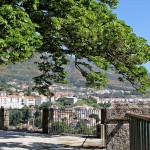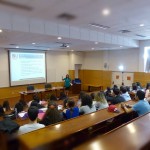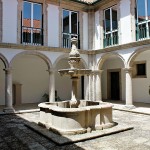I have just returned from an ERASMUS training visit (to share and develop approaches for sustainable development) at the University of Beira Interior (UBI), Covilhã, Portugal. Such a rewarding experience!
Located on the slopes of Serra da Estrela, Covilhã looks out on a fertile valley, framed by mountains – a beautiful location, largely unfamiliar to people from the UK.
The city was once regarded as the ‘Portuguese Manchester’ for its long tradition in the wool industry and textile production, however like other textile towns production ceased, people moved away, and the social and economic consequences for the region were immense.
The University has brought new life to the area and is working towards enhancing the sustainability of the region. One of the most interesting characteristics of UBI is its focus on recovering the abandoned buildings that were formally part of the industrial production process and creating a better environment; retaining historical, cultural and architectural value, while developing sustainable educational facilities has been an important goal.
During my trip I had the opportunity to visit the various sites, give presentations and meet with colleagues. The University has five Faculties (Science, Engineering, Human & Social Sciences, Arts & Letters, and Health Sciences).
Particularly interesting was the tour of the University Wool Museum which is integrated into the science building, and reveals the archaeological structures of the early production process, sets out the historical development of technology, and provides insights on industrialisation. I came away from the tour, thinking of the various ways that this facility could be used to enhance learning for students on any course, not just those interested in science and technology. The motto of the museum “The Threads of the past weaving the future” left me thinking that when we focus on sustainable development, we often emphasise ‘future generations’ but we must also acknowledge and learn from the past.
My visit to the Rectory (housed in the former Convent of Santo António and their equivalent of OVC) also left me thinking. Firstly, they have made a fantastic job of restoration and conversion; they really could do with some students (as motivated as BU students) to reclaim the lovely terraces. Olive and fruit trees are largely over-grown; the space cries out to be developed as a sustainable garden. Secondly, they have made great use of space in the former chapel, however where the choir would formerly have sat, is now where doctoral candidates are judged – the jury type seating made it seem a really intimidating space compared to a room in Christchurch House, to defend a Thesis. And lastly, if I was a member of the senior team in such an idyllic spot, I would probably not be able to resist the urge to get out a hoe and create a vegetable plot – however the urge to just sit in the sun and admire the view, would also be strong!
It is always interesting to meet new colleagues, learn from their perspectives, and to talk with students. The students I presented to during my visit (on Sustentabilidade nas Universidades) were very impressed with what we are doing in the UK, and at BU, to address sustainability. They had lots of questions; later their tutor reported that not only were they were interested to know more but were also challenging her as to why BU students seemed to have a better experience. Some were very keen to come to Bournemouth.
Overall, I came away feeling enriched and with new perspectives. I would recommend an ERASMUS visit to others. Okay the paperwork can seem bureaucratic at first glance but don’t be put off, the rewards are high. I have published four co-authored papers as a result of my first ERASMUS visit; more collaborative outputs will follow. Further, the opportunity to develop broader cultural perspectives on research interests, enhance your language capability and to evaluate how higher education operates in another country is personally and professionally rewarding.
If you would like to make contacts at UBI please get in touch. I would be happy to help.














 Upcoming opportunities for PGRs – collaborate externally
Upcoming opportunities for PGRs – collaborate externally BU involved in new MRF dissemination grant
BU involved in new MRF dissemination grant New COVID-19 publication
New COVID-19 publication MSCA Postdoctoral Fellowships 2024
MSCA Postdoctoral Fellowships 2024 Horizon Europe News – December 2023
Horizon Europe News – December 2023